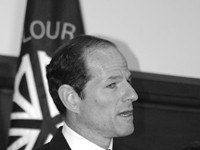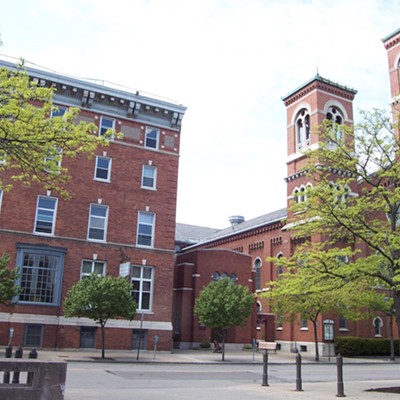It’s a mad, mad, mad, mad world
Former State Senator Rick Dollinger on the dysfunction in Albany
By Krestia DeGeorge[
{
"name": "500x250 Ad",
"insertPoint": "5",
"component": "15667920",
"parentWrapperClass": "",
"requiredCountToDisplay": "1"
}
]
To many New Yorkers, it was no shock to hear that their state legislature is dysfunctional. And not just dysfunctional, but the most dysfunctional in the nation.
To the Democratic and Republican leaders of the legislature, though, the indictment --- contained in a study by the BrennanCenter for Justice at New YorkUniversity's School of Law --- is pure poppycock. "Nonsense," huffed Senate Majority Leader Joseph Bruno. "Total nonsense."
Among the Brennan Center's charges: the legislature holds hearings on fewer than 1 percent of the major bills passed by the legislature, the Senate majority leader and Assembly speaker have almost complete control over which bills are even considered by the full legislature, and debate and amendments are often precluded.
To Rochester attorney Rick Dollinger, none of this is a surprise. Dollinger, a Democrat who served in the State Senate for 10 years, has been an outspoken critic of the legislative process and worked hard for a constitutional convention that might have resulted in major reform. In a recent interview, Dollinger discussed the BrennanCenter's report and his own experience in Albany. An edited version of that interview follows.
City:During your time in the State Senate, did you experience some of the problems the Brennan report mentions?
Dollinger: I don't think that their conclusion can be seriously debated. The New York Legislature is a unique institution, not only in government; it's a unique institution in the world. And the reason is because the employers [voters] have so little control over the employees [the legislators]. The employees are running the business instead of the employers.
There is so little electoral competitiveness in New York that none of the 212 employees are frightened by their employer. If you look at the 10 years that I was there, more people died in office, were indicted in office, or resigned their office because of criminal difficulties than were voted out by the voters. That's why the legislators are no longer responsive to the voters, because they have no fear of the voters.
City:There are a lot of reasons for that, but isn't one of them the fact that the districts are being gerrymandered into increasingly....
Dollinger: Non-competitive elections. I was on the reapportionment task force; I watched it from the inside. The gerrymandering --- the computerized skill of picking your employer --- not only are the employees not responsible, they can pick their employers. When they do that, they make it even less likely the voters will have a true say in the process.
City:What can be done about that?
Dollinger: Well, there is experimentation in a number of other states about alternatives. I personally believe that without a constitutional convention to completely rewrite the whole state constitution, nothing will happen.
City:The Brennan report recommends a number of things, like the Senate changing its rules, the Assembly changing its rules. There's nothing that would have to pass both houses, let alone a constitutional convention.
Dollinger: Right. Just rules changes.
City:Do you think those are enough?
Dollinger: I think they're a start. They would at least create the semblance of democracy inside the chamber. And ideally they would also create greater accountability: that everybody would be accountable for the vote, that every vote would matter, and as a consequence people would be able to go back to their voters and say "here's what we believe," "here's what we're doing." Now, because so few bills actually get to a vote, there's very little accountability. The proposed rule changes that came out of the BrennanCenter report do have value, but I don't see that, without a drastic voter change, they're ever going to be enacted.
I believe that the steps recommended by the BrennanCenter scratch the surface of the deep-seated problem in New York: that there isn't enough electoral competition between Democrats and Republicans. Most of the races this year in New York --- more than half of the races, I believe --- will be uncontested. As long as the system is designed to protect incumbents at the expense of vigorous political debate, the system's going to suffer from the same deficiencies that it's had for a better part of the last two decades.
In 1997, [Paychex CEO] Tom Golisano and I advocated strenuously for a constitutional convention, but only 39.6 percent of the voters supported it. And it was a great irony, because who was against the convention? Not only most elected officials --- because a constitutional convention would threaten the power of their incumbency --- but everybody who had a vested interest in the status quo.
City:Who would that be?
Dollinger: Well, labor was dead set against it. Teachers were against it. I think the trial lawyers were against it. All the Albany lobbying groups were against it. Doctors were against it. The League of Women Voters came out against it. The status quo lined up behind the status quo.
It was the one thing that Democrats and Republicans in power agreed on. No one supported it, because it's a threat to their power. It's a rewriting of the fundamental rules of government in such a way as to achieve accountability and redesign our government to make it more responsive.
City:I want to go back to gerrymandering. There are a couple of different solutions other states have proposed.
Dollinger: One is Iowa. Iowa is redistricted by a non-partisan commission. I believe New Jersey has a judicial draft of the redistricting followed by legislative approval, so it's still subjected to the legislative process.
City:Do you think any of these solutions would work in New York?
Dollinger: I believe the only way to achieve a redistricting that benefits the public without benefiting incumbents is to do it through a non-partisan method, to have the Court of Appeals appoint a group of five members who would do the reapportionment subject to legislative approval. The legislature would either have to accept it or reject it without amending it, and if it wasn't accepted it would bounce back to the five and that group would make the final decision. That group would be appointed, with two Republicans two Democrats and an independent.
That doesn't assure that it will be non-partisan, but that's probably the closest you could get.
City:What can the average voter do?
Dollinger: I think the average voter has to wake up. I think the voters in New York have been largely voting with their feet. The employers are leaving. Certainly in Western New York people are leaving. I think one of the reasons for that --- one of the reasons why it's so difficult to get young people to stay --- is because the business environment isn't competitive enough.
If people want to fight for the future of New York, they've got to go to the ballot box and ask who's making us more competitive and who isn't. And in my judgment, the biggest deterrent to an effective and competitive New York is its ineffective and uncompetitive legislature.
I think it's Woody Allen who said, "Insanity is doing the same thing time and time again and expecting a different result." Well, electing the same people time and time again and expecting a different result is a form of political insanity. I would tell people you're being politically insane if you think that doing the same thing year in and year out is going to somehow affect a change in Albany. It hasn't in the last 20 years, and I don't foresee that it will.
City:We saw very little debate going on publicly about the Campaign for Fiscal Equity solution. It was usually Assembly Speaker Sheldon Silver or Senate Majority Leader Joe Bruno or Governor George Pataki attacking one or the other's plan.
Dollinger: Yesterday was the first time I heard a serious debate about the CFE case and its implication for the state. There were quotes on National Public Radio about the debate with [State Senator] Dale Volker --- who represents a largely suburban Senate district in Buffalo --- arguing that it was unfair to take money away from suburban school districts and turn it over to urban school districts and particularly the City of New York. And [State Senator] Liz Krueger who's from the east side of Manhattan was saying that the City of New York contributes $2 billion to $3 billion a year more in revenue to the State of New York than it actually gets back.
That's really the heart of the debate over the CFE solution, because it's a question of the allocation of resources and who's going to get what. To what extent can we take limited resources and put more into the places with real need without driving up property taxes in the suburbs and other communities where the quality of education is much higher?
That is the heart of the political debate. That's what we should be talking about. It's only recently started; the last six months it's been relatively muted.
City:From your perspective as a former legislator, why do you think nothing happened? Why did CFE go for 13 months without a solution from the legislature?
Dollinger: Because there's no simple solution to this, and they might have to do the one thing that no one wants to do: raise taxes. No one wants to raise taxes; everybody wants to blame somebody else for raising taxes. Well, where are you going to get the money?
My biggest complaint about government is that everybody acts like we can continue to do things without raising taxes. You're talking about getting better than it is today, doing more than what we do now. You can't do it without more money. You can talk about efficiencies; you can talk about studying the workforce. That stuff's been done for 20 years. There may be some reduction available in the periphery, but based on my experience, you want more, you've got to pay for it.
City:You say New York fails to be competitive, and one of the examples you cited was in attracting businesses. How can you reconcile the fact that we may need to raise taxes....
Dollinger: Only if you can justify that you're getting more value. I believe most people are willing to pay if they get value. Nobody likes to pay taxes. Nobody likes to pay $20,000 for a car; the question is, do they get value for it?
In New York we pay higher taxes. We get reasonably good health care, we get reasonably good long-term care, in certain parts of the state we have the best school system in the country, bar none. We have a top-notch university system. These things we get by being New Yorkers. All of those things have real value. So it does have an expense. The question is, do we get value for it?
That also ties in with part of the CFE debate, because you will hear people say --- and it's not without some justification --- "Should we give substantial amounts of money to urban education if we don't get value for it, if we don't get results?"
Where's the trip point? Where's the point at which you say: "OK, we've given enough, we don't want to give anymore"? We ought to be having that debate.
City:Obviously, CFE is a big obstacle to the budget passing, the latest budget ever. Are there other reasons outside of that lawsuit?
Dollinger: Well, I actually think that at some point the house of cards built by the state legislature is going to come crumbling down. I think that fictitious revenues and underestimated expenses over the course of the last six years show that the state budget is seriously out of whack.
The legislature has demonstrated an uncanny ability to take that old jalopy, pour a little bit of additive in the tank, fire up the engine one more time, and get it to drive through for another year. But financially, it's in terrible shape.
City:How much longer until that house of cards collapses?
Dollinger: If you talk to the members of the legislature, they say all we need is another good economic boom and we'll be fine. We can generate enough revenue based on salaries on Wall Street and stock transfers and cash and everything else. But when is that boom going to come? And does it come before the jalopy just sheds its tires, drops its engine, and the windows pop out?
I couldn't tell the exact day of reckoning, but it ain't far away.
City:What are we --- the media --- missing here, in what we're covering? Is there a different dialogue that needs to be had that nobody's started?
Dollinger: When I look back at the history of activist journalism, whether it's Woodward and Bernstein or Upton Sinclair, all of the activist journalists who in the course of the last 100 years have produced significant political change in the US, they wrote about those who were being ignored by the political process and what was needed to change it.
The difficulty here is that it's a systemic failure. It's not a single issue. What's happening is the slow erosion of people's confidence in their government. The only impact that people see is the impact when they pay their taxes. And so the slow decline of New York doesn't strike the same journalistic fancy as the maltreatment of young children in the packing houses which Upton Sinclair talked about, or the Watergate crisis that Woodward and Bernstein brought us. What's happening is more insidious and more subtle, but in my judgment just as devastating.
I don't know how to get the electorate aroused; I don't know how to tell the fourth estate what to cover and what not to cover. I think what needs to happen is New York has to have a debate about its system of governing and how it works. There's a whole gamut of changes that are needed, and I think until that happens the slow but inevitable decline of New York will continue.
Speaking of...
Latest in News
More by Krestia DeGeorge
-

The last wild Finger Lakes
Jan 17, 2007 -

Designers get their turn at downtown
Jan 17, 2007 -

From the new governor: fighting words
Jan 10, 2007 - More »









